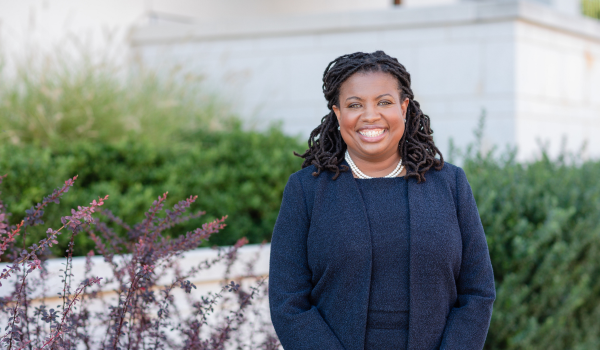Give us some background about Youth Grantmakers in Action and why you decided to become a member.
Naudia: Youth Grantmakers in Action is a youth-led group that invests in projects that make an impact on youth in our county. So, the program allows us to understand grants and philanthropy, while also making a real-life impact. One of the main reasons I joined was because I didn't have a clue what the word philanthropy meant. It also seemed like the perfect program to be able to hear from other youth in my community. I go to a charter school, so it was important to me to interact with youth from public schools and early colleges to understand what's happening beyond my small circle.
Lochlan: YGA is a program that provides the tools to solve problems among youth in our county. In this case, we make grants and that's our tool for solving problems that matter to us. I believe it was my dad who told me about YGA. He talked to me about it, and I thought it was interesting—especially the idea of allowing students to really fund programs that meaningfully impact their own communities.
Tell us more about how youth having decision-making power. Why is it so important to have someone with real-life experience making decisions about where money goes?
Naudia: Even though all adults have lived through youth, I feel like issues change over time, and especially in the world we live in right now. It’s important to consider that the youth of today will be the adults of tomorrow, so for us to be able to make decisions and understand the issues that are going on in our own community is so important. YGA is unique because we all come from such diverse backgrounds. We each bring different experiences from our own schools and cultures to the conversation, which helps us come together and look at Forsyth County at its root to see where the problems are.
Lochlan: Yeah, I'd say that's really important, because we come from all over Forsyth County and a key part of YGA is coming to a consensus on solutions to problems. I think that having all those different voices and having youth voices is really essential when you're solving youth problems. Also, having those real-life experiences at the table allows you to have your thumb on the pulse of what really matters.
Tell us more about using the consensus model to make decisions. What does coming to consensus as a group make possible?
Lochlan: Yes, we use a consensus model and the way it works is that in order to make a decision, we have to have everyone in the group come to agreement. If everybody can’t come to a decision, then we have to come back to it later. So, whenever we had even one person who didn't agree, then we had to figure out why they didn't agree. From there, the best way to find consensus was by communicating, and I think it’s ultimately about trying to find compromise. Even if you don’t personally recommend a decision, we make sure it’s a decision that everyone can live with.
Naudia: I think the consensus model taught us skills on how to understand that people have different views from us and how to actually communicate with each other. If someone did disagree, they were able to talk through it with the group. To come to a consensus, we could either agree or disagree. Someone could live with a decision or someone couldn't live with the decision. I think it taught us important skills that we’ll need as adults—to understand that we can disagree but still communicate and live with each other’s decisions.
What are you taking away from this experience?
Naudia: What I'm looking to take with me is an open mindset. This program allowed me to grow as a person and to learn how to hear other people's opinions while also learning how to be a leader. During my first year in YGA, I looked up to the seniors who had been in the program for three years and during my senior year, I was one of those leaders because I knew how everything worked. As I progress into college, I’m taking an open mindset to be able to listen to those who know more than me. Then when I get to a place where I'm able to lead others, my goal is to help others grow their skills and confidence.
Lochlan: Since I have two more years of YGA, I’m hoping to further develop those skills of leadership like Naudia mentioned, as well as my skills with finding compromise and building consensus. There will always be problems to solve in our community, so I’m looking forward to seeing what future grant applicants will come up with and how we can support their ideas.
What would you like adults to understand about your experience as a youth in our community today?
Naudia: Just being aware that we may be younger, but we are people, too. Even though we have less experience and we're coming of age, our voices need to be heard. Sometimes we understand things that adults are not aware of because we see how issues affect youth around us. And even though high schoolers go to school, and school isn't a job, sometimes school can be very stressful. We get tired and have days where we just aren’t at 100% .
Lochlan: I think that whenever you give youth the chance to solve problems in our own communities, we can be really creative and very enterprising. YGA reflects this and shows how dedicated we are to solving the problems of our world.



.png)
.png)




.png)
%20feature%20image.png)
.png)
.png)